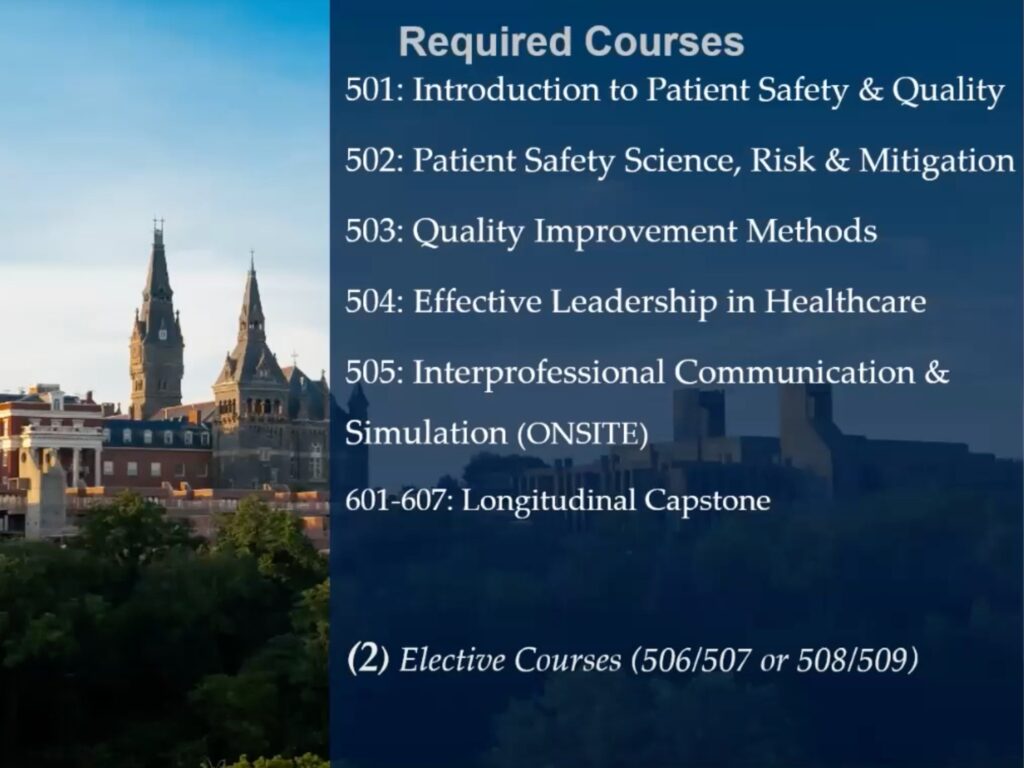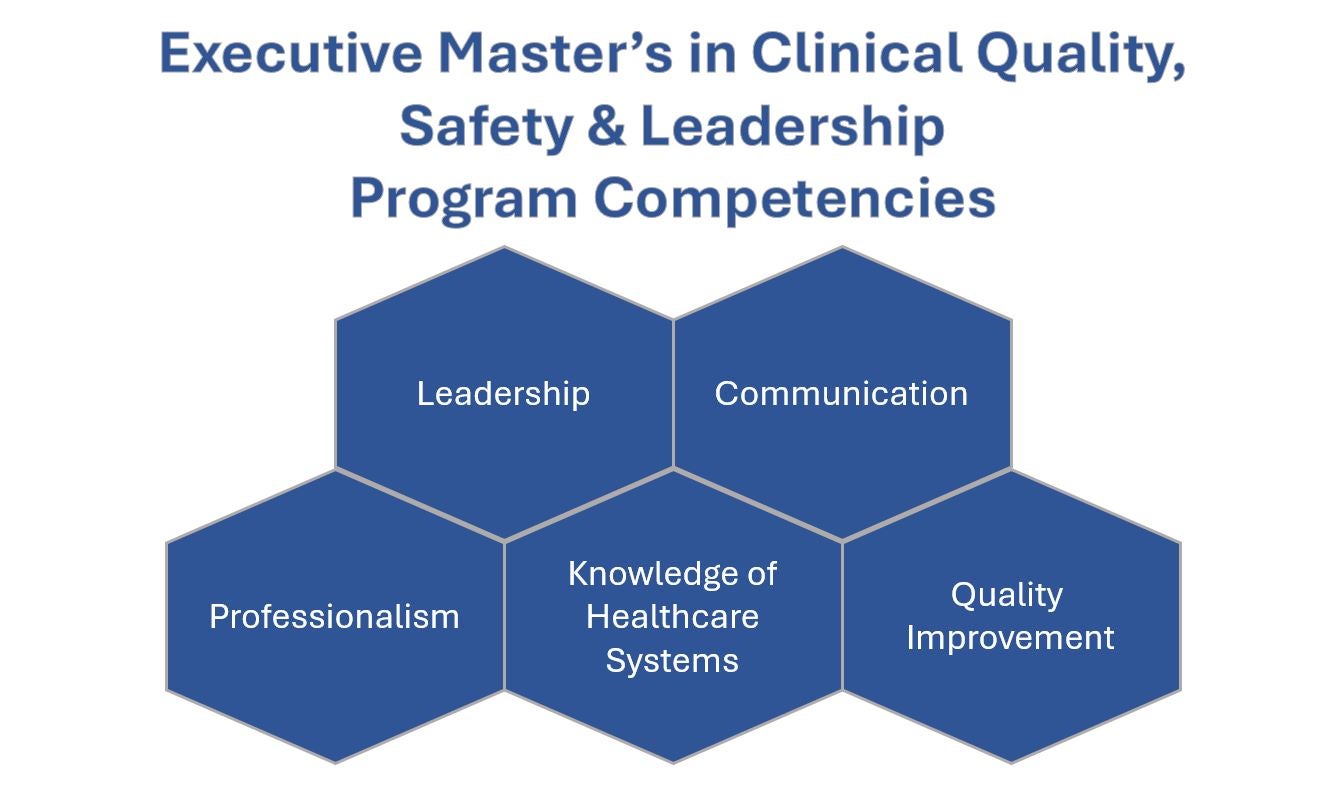Mission
To transform motivated professionals into healthcare patient safety and quality leaders through adaptability and reflective lifelong curiosity. Transformation occurs through interdisciplinary learning and real-world application of safety science, leadership, communication, teamwork, and quality improvement.
Vision
We aspire to be the premier graduate program for patient safety and quality leadership.
Values
- Service
- Equity
- Collaboration
- Innovation
- Scholarship
Learn More About Us
Watch our recorded info session for an overview of the Executive Master’s program, or fill out our information request form.
Request More InformationProgram Outcomes
Academic
Year | Full Time
Enrolled | Full Time
Completion Rate | Part-Time
Enrolled | Part-Time
Completion Rate | Certificate
Enrolled | Certificate Completion Rate |
|---|
| 2023-2024 | 12 | 92% | 0 | — | 5 | 40% |
| 2022-23 | 15 | 100% | 2 | 100% | 1 | 100% |
| 2021-22 | 12 | 100% | 2 | 100% | 3 | 100% |
| 2020-21 | 6 | 100% | 3 | 67% | 2 | 100% |
| 2019-20 | 7 | 100% | 1 | 100% | 2 | 100% |
| 2018-19 | 2 | 100% | 0 | — | 0 | — |
| 2018 | 2 | 100% | 0 | — | 1 | 100% |
Program Competencies
A competency-based curriculum considers what learners are expected to demonstrate, rather than focusing on what they are expected to know or retain. This program’s competency model was developed based on desired performance outcomes. The curriculum and facilitation methods support the attainment of the competency.
The competency model is not a substitute for the class grade. Students will be assessed on their level of attainment competencies during each course and will receive constructive feedback.
Leadership
- Analyze leadership’s role in creating & maintaining a safety culture.
- Adapt leadership skills, behaviors, and management techniques to align with the healthcare setting.
- Develop influence practices to support healthcare initiatives.
- Identify your role as a change management leader.
- Actively foster a culture of diversity, equity, and inclusion with patients, families, and colleagues in the healthcare environment.
Communication
- Conduct open, honest, and transparent communication with patients, families, and colleagues.
- Deliver clear and concise written and oral communication accounting for audience, purpose, and outcomes.
- Demonstrate effective communication in a hierarchical healthcare environment.
- Develop collaboration amongst multidisciplinary team members.
Professionalism
- Prioritize self-development through networking, self-directed learning, and reflection.
- Analyze individual assumptions, biases, strengths, and limitations.
- Demonstrate the role of personal and organizational ethics & values.
Knowledge of Healthcare Systems
- Explain the interrelationship of access, quality, cost, and resource allocation on patient care.
- Examine and apply risk assessment, reporting, data analysis, and human factors principles to promote quality and safety.
- Demonstrate knowledge of governmental, regulatory, and accreditation agencies related to healthcare.
- Build an understanding of the interdependency, integration, and competition within healthcare.
Quality Improvement
- Prioritize critical thinking by collating, interpreting, analyzing, and evaluating relevant data to support effective decision-making.
- Compare, contrast, and apply commonly used quality improvement techniques, methodologies, and tools and how they apply to support organizational performance.
- Identify opportunities, develop proposals, redesign processes, and implement improvements utilizing best practices and evidence-based research through quality and process improvement.
Competency/Proficiency Levels
Level 1: Beginner
The student has a common knowledge or an understanding of basic techniques and concepts.
Level 2: Intermediate
The student can successfully complete tasks in this competency as requested. Help from an expert may be required from time to time, but you can usually perform the skill independently.
- Focus is on applying and enhancing knowledge or skill.
- You have applied this competency to situations occasionally while needing minimal guidance to perform successfully.
- You understand and can discuss the application and implications of changes to processes, policies, and procedures in this area.
Level 3: Advanced
The student can perform the actions associated with this skill without assistance. The student would be recognized within his/her peer group or organization as “a person to ask” when difficult questions arise regarding this specific skill.
- Focus is on broad organizational/professional issues.
- You have consistently provided practical/relevant ideas and perspectives on the process or practice improvements which may easily be implemented.
- You are capable of coaching others in the application of this competency by translating complex nuances relating to this competency into easy to understand terms.
- You participate in senior-level discussions regarding this competency.
- You assist in the development of reference and resource materials in this competency.
Explore Our Programs

